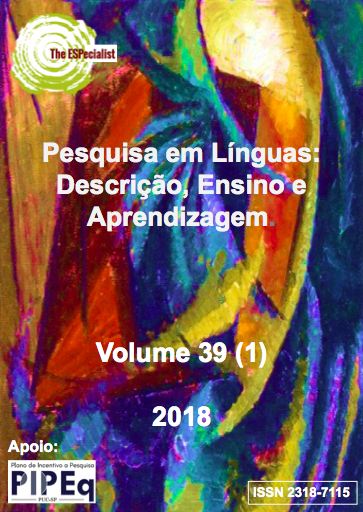READING STRATEGIES IN ENGLISH: FOCUS ON PHYSICS-RELATED ACADEMIC TEXTS
DOI:
https://doi.org/10.23925/2318-7115.2018v39i1a5Keywords:
Reading comprehension, Reading strategies, Academic English, English in Physics, Cloze testAbstract
The present study aims to verify whether the awareness of the use of reading strategies would contribute to the comprehension of academic texts in English of four undergraduate students. This is a qualitative and quantitative research. A questionnaire, a cloze test, and verbal reports were used for data collection. Students reported having more facility on reading the texts after being conscious of the reading strategies. There was a significant improvement on the reading comprehension of the students that participated in the study and these data will surely contribute to future research on reading in English for academic purposes.
References
ANGLAT, H. D. El testclozeenlaevaluación de lacomprensióndel texto informativo de nível universitário. Revista de Lingüística Teórica y Aplicada Concepción, v. 46, n.1, p. 121-137, 2008.
BRIÈRE, E. J.; CLAUSING, G.; SENKO, D.; PURCELL, E. A look at cloze testing across languages and levels source: The Modern Language Journal, v. 62, n. 1/2, p. 23-26, 1978.
BROWN, J. D. Relative merits of four methods for scoring cloze tests. The Modern Language Journal, v. 64, n. 3, p. 311-317, 1980.
BROWN, J. D. Do cloze tests work? Or, is it just an illusion? Second Language Studies, v. 21, n. 1, p. 79-125, 2002.
CARREL, P. L; CARSON, J. G. First and second language reading strategies: evidence from cloze. Reading in a ForeignLanguage. v. 10, n. 1, p. 953- 965, 1993.
CASTRO, R. M. C. A. Compreensão da leitura: aplicação da técnica do procedimento close nos ensinos fundamental e médio. Crátilo: Revista de Estudos Lingüísticos e Literários. Patos de Minas, v. 1, p. 70-78, 2008.
COHEN, A. D. Mentalistic measures in reading strategy research: some recent findings. English for Specific Purposes, v. 5, n. 2, p. 131- 145, 1986.
______. Studying Learners Strategies: How we get the information. Chapter 3. In: WENDER, A.; RUBIN, J. (Ed.). Learner strategies in language learning. New York: Prentice/ Hall International, p. 31-38,1987.
COHEN, A. D; HOSENFELD, C. Some uses of mentalistic data in second language research. Language Learning, v. 3, n. 2, p. 285-313, 1981.
GOODMAN, K.S. Reading: A psycholinguistic guessing game. Journal of the Reading Specialist, v. 6, p. 126-135, 1967.
KATO, M. A.O aprendizado da leitura. 6ª ed. São Paulo: Martins Fontes, 2007.
KLEIMAN, Â. B. Texto e leitor: aspectos cognitivos da leitura. São Paulo: Pontes, 1989.
______. Oficina de leitura. Teoria e Prática. 9ª ed. Campinas: Pontes, 2002.
______. Leitura: ensino e pesquisa. Campinas: Pontes, 2004.
LEFFA, V. J. Aspectos da leitura. Porto Alegre: Sagra,1996.
MACLEAN, M. Using rational cloze for diagnostic testing in Ll and L2 reading. Tesl Canada Journal/Revue Tesl du Canada, v 2, n. 1, 1984.
NUTTAL, C. Teaching reading skills in a foreign language. Hong Kong: Macmillan Heinemann, 1996.
OLIVEIRA, K.; BORUCHOVITCH, E; SANTOS, A. A. A .A técnica de Cloze na avaliação da compreensão em leitura. In: SANTOS, A. A. A; BORUCHOVITCH,
E; OLIVEIRA, K. L (Org.) In: Cloze: Um instrumento de diagnóstico e intervenção. São Paulo: Casa do Psicólogo, 2009. p.47-78
OLLER, J. W. Scoring methods and difficulty levels for cloze tests of proficiency in English as a second language. The Modern Language Journal, v. 56, n.3, p. 151-158, 1972.
SANTOS, A. A. A. ; PRIMI, R.; TAXA, F. O. S.; VENDRAMINI, C. M. M. O teste cloze na avaliação da compreensão em leitura. Psicologia: Reflexão e Crítica, v. 15, n. 3, p. 549-560, 2002.
SANTOS, A. A. A.; BORUCHOVITCH, E; OLIVEIRA, K. L .Cloze: um instrumento de diagnóstico e intervenção. São Paulo: Casa do Psicólogo, 2009.
SANTOS, E. C. P. Compreensão de leitura: aplicação da técnica de cloze em estudantes universitários. Intellectus: Revista Acadêmica Digital das Faculdades Unopec, n. 4, p. 58 - 81, 2005.
SILVA, M. J. M.; SANTOS, A. A. A. A avaliação da compreensão em leitura e o desempenho acadêmico de universitários. Psicologia em Estudo, v. 9, n. 3, p. 459-467. 2004.
SILVA, E. M. T.; WITTER, G. P. Compreensão de texto e desempenho acadêmico em estudantes de psicologia. Estudos de Psicologia, v. 25, n. 3. 2008.
SILVEIRA, M. I. M. Modelos Teóricos e Estratégias de Leitura: suas implicações no ensino. Maceió:EDUFAL, 2005.
SMITH, F. Compreendendo a leitura: uma análise psicolinguística da leitura e do aprender a ler. Porto Alegre: Artes Médicas, 1989.
Downloads
Additional Files
Published
How to Cite
Issue
Section
License
The authors grant the journal all copyrights relating to the published works. The concepts issued in signed articles are the absolute and exclusive responsibility of their authors.


 Esta obra está licenciada com uma Licença
Esta obra está licenciada com uma Licença 